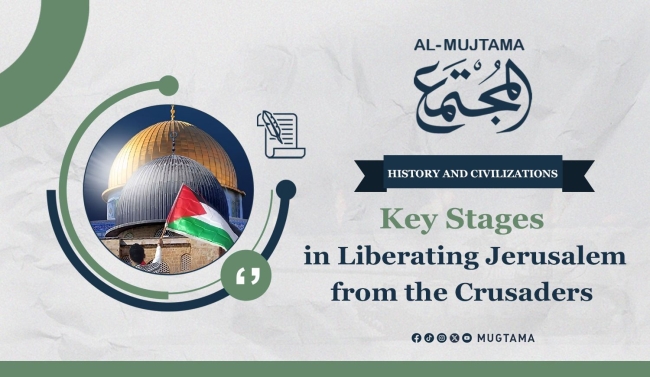Key Stages in Liberating Jerusalem from the Crusaders
In the late eleventh century, the Islamic world witnessed one of its most challenging historical periods as Europe launched a crusade, aiming to control Jerusalem and the Islamic East. These campaigns began with a surprise invasion, quickly achieving their goals due to the weakness and division in the nation at the time. However, Muslims mobilized their forces, and a series of effective efforts led to the liberation of Jerusalem by the leader Salah al-Din al-Ayyubi.
In this article, we highlight the most significant stages that Muslims faced on their path to liberation:
1- The beginning of the Crusades and Jerusalem's fall:
The Crusades began after Pope Urban II's speech in 1095 AD, urging Europe to liberate Jerusalem. Antioch fell in 1098 AD, followed by Jerusalem on July 15, 1099, AD. The Crusaders committed brutal massacres, taking advantage of the weak and divided Islamic world.
2- Early reform and resistance efforts:
The Islamic nation started to resist the Crusaders, with Seljuk minister Nizam al-Mulk's reformist efforts standing out. He established the "Nizamiyya" schools, while Aq Sunqur restored order in Aleppo, preparing to confront the Crusaders.
3- Achievements of Imad al-Din Zangi:
Aq Sunqur's son Imad al-Din Zangi succeeded him, achieving significant victories over the Crusaders, including restoring the Kingdom of Edessa in 539 AH. Despite his military successes, Imad al-Din was martyred during the siege of Ja'bar Castle in 541 AH.
4- Nur al-Din Zangi and unity of efforts:
Nur al-Din Zangi united Islamic forces against the Crusaders, working to strengthen military power and eliminate the Fatimids in Egypt in 567 AH. This helped bolster the Muslim position against the Crusaders.
5- Saladin Al-Ayyubi and the Battle of Hattin:
Following Nur Al-Din's death, Saladin Al-Ayyubi united the Levant and prepared to liberate Jerusalem. In the Battle of Hattin on July 4, 1187 AD, he defeated the Crusader army, leading to the liberation of Palestinian cities.
6- Liberation of Jerusalem and Al-Aqsa's restoration:
After several victories, Saladin besieged Jerusalem on Rajab 15, 583 AH, liberating it on Rajab 27, 583 AH, equivalent to October 2, 1187 AD. He focused on Al-Aqsa Mosque, removing Crusader elements and restoring Muslim control, holding the first Friday prayer post-liberation.


